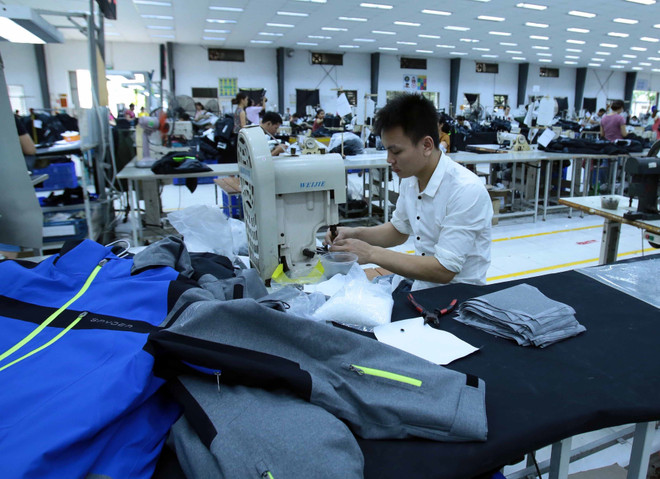 The garment factory of the Kydo Vietnam Co. Ltd in Pho Noi A Industrial Park, Hung Yen province (Photo: VNA)
The garment factory of the Kydo Vietnam Co. Ltd in Pho Noi A Industrial Park, Hung Yen province (Photo: VNA)Hanoi (VNA) – Vietnamese businesses arehaving high hopes for bigger market shares in the European Union (EU) thanks tothe bilateral free trade agreement (EVFTA) signed recently.
Among the commodities with high export revenue tothe EU in the first half of 2019, textile-garment brought home over 15 billionUSD, up 9.9 percent year on year, according to the Ministry of Industryand Trade (MoIT).
Vice Chairman of the Vietnam Textile and ApparelAssociation Truong Van Cam said right since late 2018 and early 2019, manybusinesses have received enough orders for export until the end of Septemberand even the whole year. Notably, the recent influx of investment capital hashelped the textile-garment sector gradually perfect its domestic supply chains,which will boost products’ competitiveness.
In particular, the EVFTA has opened the doorwide for Vietnamese exports to European markets, and textile-garment andfootwear are among the big beneficiaries of this deal, he noted.
Pham Thi Thu Huong, CEO of the Minh Tri Co. Ltd,said in 2018 and earlier, her company’s textile-garment exports to the EUaccounted for only 10 percent of its total overseas shipments.
As the EU is a demanding market, in the past,the firm only had small orders. Since early 2019, to gear up for the EVFTA, ithas increased investment to expand producing items for export to the EU, shenoted.
As a result, Minh Tri recorded a year-on-yearrise of 18 percent in its exports to this market in the first six months of2019, and hopes that the figure will reach 25 percent for the whole year.
Huong said the company is having highexpectations of the EU because this is a market with high value. Its shipmentscan further increase in the years ahead.
She added when the EVFTA takes effect, it willopen up numerous new opportunities for textile-garment businesses. They willhave more chances to enter this giant market, sell their products at higherprices and improve their manufacturing capacity via the application of newproduction technologies.
According to Director of the MoIT’sEuropean-American Market Department Ta Hoang Linh, aside from preferentialtariffs, the EVFTA also includes strict requirements. If Vietnamese firms donot make preparations right from now, it will be hard for their products tobenefit from these preferential treatments.
Rules of origin are among the issues thatcompanies must comply with so as to ship goods to the EU since most ofmaterials of Vietnamese exports currently come from China and ASEAN.
To be subject to preferential tariffs, productsmust be made with certain rates of materials from Vietnam or the EU, theofficial elaborated.
Huong admitted that the country’stextile-garment sector still depends much on materials from China. To make useof FTAs, including the one with the EU, businesses should build strategies fordeveloping domestic supply chains to satisfy the rules of origin. Additionally,authorised agencies also need to step up administrative and customs procedurereforms to help firms save cost and time.
Echoing the view, Linh said enterprises shouldbe more active in ensuring their material supply so as to meet the EU’s rulesof origin, thus helping to expand the market share of Vietnamese textile-garmentin this market.-VNA





























